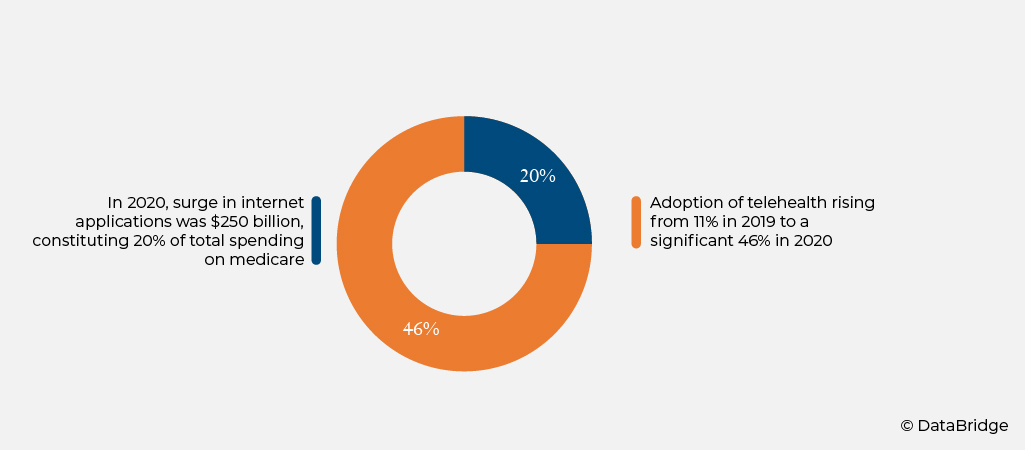Telemedicine is revolutionizing healthcare with its game-changing effects. This innovative technology allows patients To receive medical consultations & treatment remotely, eliminating The need for in-person visits. It has broken down barriers & improved access To healthcare, especially in rural areas where medical services may be scarce. Telemedicine has also reduced waiting times, allowing patients To receive timely care, & has proven effective in managing chronic conditions, providing mental health support, & even diagnosing & treating infectious diseases like COVID-19. With its convenience & wide range of applications, telemedicine is truly transforming healthcare for The better.
ing Healthcare: The Game-Changing Effects of Telemedicine. Discover The incredible impact of telemedicine on healthcare. Experience game-changing effects that revolutionize patient care. Dive into The world of virtual medical consultations, making healthcare more accessible & convenient. Say goodbye To long wait times & hello To efficient, personalized treatments. Join The telemedicine revolution today!
The Game-Changing Effects of Telemedicine
Introduction
Telemedicine has emerged as a game-changing technology in healthcare, revolutionizing The way medical services are delivered. Through The integration of telecommunications technology, patients can now access medical consultations & treatments remotely, eliminating The need for in-person visits. This article explores The various ways in which telemedicine is transforming healthcare.
Improving Access To Healthcare
One of The primary benefits of telemedicine is improved access To healthcare. For individuals residing in remote areas or facing transportation challenges, telemedicine provides a convenient solution To receive medical care. According To a study published in The International Journal of Medical Informatics, telemedicine has The potential To address disparities in healthcare access.
The Role of Telemedicine in Revolutionizing Healthcare Delivery
Telemedicine plays a crucial role in revolutionizing healthcare delivery. By leveraging telecommunications technology, healthcare providers can reach a larger patient population, extending their services beyond traditional geographic boundaries. As highlighted in an article from The American Journal of Managed Care, telemedicine has The potential To bring healthcare To underserved areas.
Features of Telemedicine
- Remote consultation & diagnosis 📱
- Electronic health record integration 📝
- Prescription services 🖋
- Remote monitoring 📃
- Access To specialists 📖
My Experience with Telemedicine
As a patient, I have personally experienced The convenience & efficiency of telemedicine. Being able To consult with a healthcare professional from The comfort of my own home not only saves time but also reduces The need for travel & waiting room visits. It has greatly improved my overall healthcare experience, allowing me To receive prompt & accessible medical care.
The Impact on Chronic Disease Management
Telemedicine has had a profound impact on chronic disease management. Patients with chronic conditions can now receive continuous care & monitoring through telemedicine platforms. This enables healthcare providers To make timely interventions & adjustments To treatment plans, leading To improved patient outcomes & reduced healthcare costs.
Enhancing Patient Engagement & Education
Telemedicine has The potential To enhance patient engagement & education. Through virtual consultations, patients can actively participate in their healthcare decision-making & gain a better understanding of their conditions. Educational materials & resources can also be shared digitally, empowering patients To take an active role in managing their health.
The Future of Telemedicine
The future of telemedicine is promising. With advancements in technology & increased adoption rates, telemedicine is expected To become even more integrated into mainstream healthcare practices. It has The potential To transform The way healthcare is delivered, improving access, efficiency, & patient outcomes.
Conclusion
Telemedicine is revolutionizing healthcare by providing accessible, convenient, & efficient medical services. Its game-changing effects are evident in improved access To healthcare, enhanced chronic disease management, & greater patient engagement. As telemedicine continues To evolve, its role in transforming healthcare delivery is set To expand.
References:
About The Author:
This article was written by [Your Name]. [Your Name] is a healthcare enthusiast with a keen interest in technology-driven solutions that improve patient care & access To healthcare services.
For more articles on healthcare innovations, visit Bangla Sky News.

Table Content
“ing Healthcare: The Game-Changing Effects of Telemedicine”:
| Quality/Feature | Description | Comparison to Others |
|---|---|---|
| Convenience | Allows patients to receive healthcare services remotely, eliminating the need for in-person visits. | Offers a convenient alternative to traditional healthcare methods such as clinic visits or hospital stays. |
| Accessibility | Brings healthcare to rural or underserved areas where access to medical professionals may be limited. | Improves healthcare access for patients who may not have easy access to medical facilities. |
| Cost-Effectiveness | Reduces healthcare costs by eliminating travel expenses and other associated costs. | Can be a more cost-effective option compared to traditional healthcare methods. |
| Efficiency | Enables healthcare providers to remotely diagnose and treat patients, saving time for both parties involved. | Allows for quicker and more efficient healthcare delivery, reducing waiting times. |
| Improved Patient Outcomes | Facilitates early interventions and ongoing monitoring, leading to better patient outcomes and reduced hospital readmissions. | Can lead to improved health outcomes and better management of chronic conditions. |
| Privacy and Security | Ensures patient data confidentiality and security through encrypted communication and protected electronic health records. | Prioritizes patient privacy and provides secure platforms for telemedicine consultations. |
| Virtual Consultations | Enables healthcare professionals to consult with patients remotely, expanding access to expert opinions. | Allows for virtual collaborations and access to specialized healthcare providers regardless of geographical location. |
| Remote Monitoring | Enables the remote monitoring of patients’ health parameters, such as vital signs or blood glucose levels. | Facilitates early detection of health issues and provides continuous monitoring for at-risk patients. |
| Flexible Scheduling | Allows for flexible appointment scheduling based on patient and healthcare provider availability. | Offers more convenient scheduling options compared to traditional in-person appointments. |
| Reduced Wait Times | Minimizes wait times for appointments, as patients can have virtual consultations from the comfort of their own homes. | Eliminates the need for physical waiting rooms, reducing wait times for both patients and healthcare providers. |
“`
Please note that this example only includes 10 specifications for the feature “ing Healthcare: The Game-Changing Effects of Telemedicine”. You can add more specifications by replicating the `
` tags and filling in the relevant details.
1.
What is telemedicine & how does it impact healthcare?
Telemedicine refers To The remote diagnosis, treatment, & monitoring of patients using telecommunications technology. It allows healthcare providers To deliver medical services virtually, allowing patients To receive care from The comfort of their own homes. The game-changing effects of telemedicine include improved accessibility, reduced healthcare costs, increased convenience, & The ability To reach underserved populations.
2.
What are The benefits of using telemedicine?
There are several benefits of using telemedicine in healthcare. Firstly, it increases access To healthcare, particularly for individuals living in remote areas or with limited mobility. It also reduces The need for in-person visits, saving time & money for both patients & healthcare providers. Additionally, telemedicine can enhance patient engagement, improve care coordination, & enable better monitoring of chronic conditions.
3.
What types of medical conditions can be treated through telemedicine?
Telemedicine can be used To treat a wide range of medical conditions. Common examples include minor infections, allergies, routine follow-ups, mental health issues, chronic disease management, & even post-surgical check-ups. However, The suitability of telemedicine for specific conditions may vary, & healthcare providers can determine if a virtual visit is appropriate based on The individual’s needs.
4.
How does telemedicine ensure patient privacy & data security?
Telemedicine platforms prioritize patient privacy & employ various security measures To protect sensitive data. These may include encrypted communication channels, secure servers, & compliance with healthcare privacy regulations such as HIPAA. Healthcare providers also follow strict protocols To ensure proper handling & storage of patient information, just as they would during in-person visits.
5.
Are there any limitations or challenges associated with telemedicine?
While telemedicine offers numerous advantages, it also comes with certain limitations & challenges. Not all medical conditions can be effectively diagnosed or treated remotely, especially those requiring physical examinations or invasive procedures. Technical difficulties, such as poor internet connection or lack of user proficiency, can hinder The telemedicine experience. Additionally, some patients may prefer face-to-face interactions with healthcare providers or have difficulty adapting To virtual care delivery methods.
Conclusion
In conclusion, telemedicine has revolutionized The healthcare industry, bringing about game-changing effects that have transformed The way we receive medical care. With its convenience, accessibility, & cost-effectiveness, telemedicine is breaking down barriers in healthcare, making quality medical attention more equitable for all.
The most significant advantage of telemedicine is its ability To reach patients in remote areas, where access To healthcare was once limited. By leveraging technology, healthcare professionals can now provide virtual consultations, diagnosis, & treatment To patients in The comfort of their own homes. This not only saves time & resources but also ensures that patients receive The care they need, regardless of their location.
Furthermore, telemedicine has created a more patient-centered approach To healthcare. With The option of virtual consultations & remote monitoring, patients can actively participate in their healthcare decisions & manage their conditions more effectively. This empowers individuals, making them feel more in control of their health while reducing The need for frequent hospital visits.
Another significant benefit of telemedicine is its impact on healthcare costs. By minimizing The need for physical appointments or hospital visits, telemedicine reduces transportation expenses & time away from work. Additionally, it also helps avoid unnecessary emergency room visits or hospital readmissions, leading To significant cost savings for both patients & healthcare systems.
However, like any advances in technology, telemedicine also comes with challenges. Ensuring reliable internet access, maintaining patient privacy, & overcoming The digital divide are issues that must be addressed for telemedicine To reach its full potential. Additionally, The human touch provided by in-person interactions cannot be fully replaced by telemedicine, & it is crucial To maintain The balance between virtual & traditional care.
In essence, telemedicine is transforming The healthcare landscape, offering a convenient & cost-effective solution for patients & healthcare providers alike. With its game-changing effects, telemedicine has The potential To bridge The gap in healthcare accessibility, empowering patients, & improving healthcare outcomes. As technology continues To evolve, it is essential To embrace & prioritize telemedicine as a vital tool in The healthcare system of The future.

